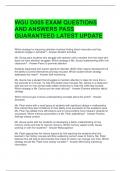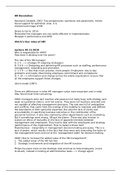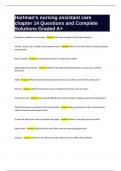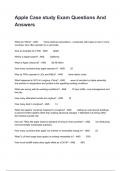Class 1: Introduction to Law, Governance
and Development
Lecture
1. Why would some people use the formal approach to the Rule of Law (RoL)?
2. Tamanaha writes: “Rule by law carries scant connotation of legal limitations on
government, which is the sine qua non of the rule of law tradition.” (p.92) What does
he mean by that?
3. In your opinion, is formal legality a moral good, one that deserves the obedience of its
citizens?
Reading
Tamanaha, Brian Z. On the rule of law. History, Politics and Theory. (2004) Chapters 7 and
8: pp.91-113. https://www.cambridge.org/core/services/aop-cambridge-core/content/view/
4E1802BA5BCE323A47610FF4649BE9A7/9780511812378c7_p91-101_CBO.pdf/
formal_theories.pdf
There are 2 main theoretical formulations of the rule of law: Formal and Substantive
Thin (few requirements) and Thick (many requirements) formulations
, Formal Law is concerned with the formal aspects of the law (source and form of
legality)
o Formal conceptions of the rule of law address the manner in which the law
was promulgated (was it by a properly authorised person); the clarity of the
ensuing norm (was it sufficiently clear to guide an individual’s conduct so as
to enable a person to plan his or her life, etc.); and the temporal dimension of
the enacted norm (was it prospective.. .).
o Not concerned with the actual content of the law itself.
Substantive Law has the attributes of formal law but also includes requirements about
the content of law.
o Should comport with justice or a moral principle.
o They distinguish between good and bad law.
Both implicate one another however.
FORMAL VERSIONS OF THE LAW (In order from thin to thick)
1. Rule by Law
o Law is the means by which states conduct their affairs
o In extreme cases (what the sovereign does is law); rule of law actually has no
meaning then cuz rule of law means that government action should be
authorised by law
o Rule by law does not connote that there are limitations to government
o China is an example of a state that takes this approach
2. Formal Legality
o there is an absence of any separate criteria of the good or just with respect to
the content of the law.
o “The law may . . . institute slavery without violating the rule of law”
o “The law must be capable of guiding the behaviour of its subjects
o The law must be prospective, general, clear, public, and relatively stable.
o To effectuate rules of this kind: an independent judiciary, open and fair
hearings without bias, and review of legislative and administrative officials
and limitations on the discretion of police to insure conformity to the
requirements of the rule of law.
o You have freedom to do what the law permits
o “It says nothing about how the law is to be made: by tyrants, democratic
majorities, or any other way. It says nothing about fundamental rights, about
equality, or justice.” It imposes only procedural requirements, only restrictions
about the form that law must take.
o Some say that formal legality allows fundamental rights violations
o Some say the neutrality is more likely to command support on its own terms
from right, left, and centre in politics than is a substantive theory which …
incorporates controversial substantive content.” or universal application
(World Bank believes).
o What formal legalists don’t agree on are: how to understand the equality
requirement, and on whether the rule of law itself represents a moral good.
o Equality Requirement
Adherents of this version of the rule of law are in substantial
agreement about its requirements and its implications, except for two
, points: on how to understand the equality requirement, and on whether
the rule of law itself represents a moral good.
Two understandings of the equality requirement can be found in the
literature.
Hayek held that equality prohibited the enactment of laws that
made arbitrary distinctions among people. The problem with
this restriction is that it requires a substantive standard to
determine what counts as “arbitrary.” Another serious problem
is the reality that law makes a multitude of distinctions all the
time that could have been drawn differently.
eg: Progressive taxation, imposes different tax
percentages pegged at various income levels. Most
formal accounts however argue that equality is
“equality before the law” regardless who they might be.
Hayek does not support this.
o The morality of formal legality
Must citizens obey the rule of law.
Fuller argued that the rule of law itself is a moral good
Enhances individual autonomy
Legal systems with these formal characteristics will more likely
also have laws with fair and just content.
At least the procedural requirements of the rule of law prohibit
the government from acting in an entirely ad hoc arbitrary
fashion.
Raz disagrees
A knife can be used to cut veg or to stab a person.
Knife alone is not good or bad, what you do with it is.
“Repressive law is perhaps less terrible than lawless repression,
but it can be terrible all the same.”
See it from both sides: “Formal legality enhances the dignity of
citizens by allowing them to predict and plan, no doubt a moral
positive. Just as importantly, however, any moral evaluation of the law,
any determination of whether it generates a moral obligation of
compliance on the part of citizens, must also consider the moral
implications of the content of the rules and their effects.”
o Rule of law, the historical inspiration of which has been the restraint of
tyranny by the sovereign.
o With this in mind, it is correct to conclude that formal legality has more in
common with the idea of rule by law than with the historical rule of law
tradition.
o Formal legality is a matter of rules
Laws are rules, way of governing behaviour.
You cannot make ad hoc decisions.
No such thing as a retroactive rule.
Rules can also be followed on a circumstantial basis; thats why there is
formal legality in despotic states as well as welfare states.
3. Democracy and formal legality
o Consent determines the content of laws.
o Democracy is the procedural means through which the content is decided on.
and Development
Lecture
1. Why would some people use the formal approach to the Rule of Law (RoL)?
2. Tamanaha writes: “Rule by law carries scant connotation of legal limitations on
government, which is the sine qua non of the rule of law tradition.” (p.92) What does
he mean by that?
3. In your opinion, is formal legality a moral good, one that deserves the obedience of its
citizens?
Reading
Tamanaha, Brian Z. On the rule of law. History, Politics and Theory. (2004) Chapters 7 and
8: pp.91-113. https://www.cambridge.org/core/services/aop-cambridge-core/content/view/
4E1802BA5BCE323A47610FF4649BE9A7/9780511812378c7_p91-101_CBO.pdf/
formal_theories.pdf
There are 2 main theoretical formulations of the rule of law: Formal and Substantive
Thin (few requirements) and Thick (many requirements) formulations
, Formal Law is concerned with the formal aspects of the law (source and form of
legality)
o Formal conceptions of the rule of law address the manner in which the law
was promulgated (was it by a properly authorised person); the clarity of the
ensuing norm (was it sufficiently clear to guide an individual’s conduct so as
to enable a person to plan his or her life, etc.); and the temporal dimension of
the enacted norm (was it prospective.. .).
o Not concerned with the actual content of the law itself.
Substantive Law has the attributes of formal law but also includes requirements about
the content of law.
o Should comport with justice or a moral principle.
o They distinguish between good and bad law.
Both implicate one another however.
FORMAL VERSIONS OF THE LAW (In order from thin to thick)
1. Rule by Law
o Law is the means by which states conduct their affairs
o In extreme cases (what the sovereign does is law); rule of law actually has no
meaning then cuz rule of law means that government action should be
authorised by law
o Rule by law does not connote that there are limitations to government
o China is an example of a state that takes this approach
2. Formal Legality
o there is an absence of any separate criteria of the good or just with respect to
the content of the law.
o “The law may . . . institute slavery without violating the rule of law”
o “The law must be capable of guiding the behaviour of its subjects
o The law must be prospective, general, clear, public, and relatively stable.
o To effectuate rules of this kind: an independent judiciary, open and fair
hearings without bias, and review of legislative and administrative officials
and limitations on the discretion of police to insure conformity to the
requirements of the rule of law.
o You have freedom to do what the law permits
o “It says nothing about how the law is to be made: by tyrants, democratic
majorities, or any other way. It says nothing about fundamental rights, about
equality, or justice.” It imposes only procedural requirements, only restrictions
about the form that law must take.
o Some say that formal legality allows fundamental rights violations
o Some say the neutrality is more likely to command support on its own terms
from right, left, and centre in politics than is a substantive theory which …
incorporates controversial substantive content.” or universal application
(World Bank believes).
o What formal legalists don’t agree on are: how to understand the equality
requirement, and on whether the rule of law itself represents a moral good.
o Equality Requirement
Adherents of this version of the rule of law are in substantial
agreement about its requirements and its implications, except for two
, points: on how to understand the equality requirement, and on whether
the rule of law itself represents a moral good.
Two understandings of the equality requirement can be found in the
literature.
Hayek held that equality prohibited the enactment of laws that
made arbitrary distinctions among people. The problem with
this restriction is that it requires a substantive standard to
determine what counts as “arbitrary.” Another serious problem
is the reality that law makes a multitude of distinctions all the
time that could have been drawn differently.
eg: Progressive taxation, imposes different tax
percentages pegged at various income levels. Most
formal accounts however argue that equality is
“equality before the law” regardless who they might be.
Hayek does not support this.
o The morality of formal legality
Must citizens obey the rule of law.
Fuller argued that the rule of law itself is a moral good
Enhances individual autonomy
Legal systems with these formal characteristics will more likely
also have laws with fair and just content.
At least the procedural requirements of the rule of law prohibit
the government from acting in an entirely ad hoc arbitrary
fashion.
Raz disagrees
A knife can be used to cut veg or to stab a person.
Knife alone is not good or bad, what you do with it is.
“Repressive law is perhaps less terrible than lawless repression,
but it can be terrible all the same.”
See it from both sides: “Formal legality enhances the dignity of
citizens by allowing them to predict and plan, no doubt a moral
positive. Just as importantly, however, any moral evaluation of the law,
any determination of whether it generates a moral obligation of
compliance on the part of citizens, must also consider the moral
implications of the content of the rules and their effects.”
o Rule of law, the historical inspiration of which has been the restraint of
tyranny by the sovereign.
o With this in mind, it is correct to conclude that formal legality has more in
common with the idea of rule by law than with the historical rule of law
tradition.
o Formal legality is a matter of rules
Laws are rules, way of governing behaviour.
You cannot make ad hoc decisions.
No such thing as a retroactive rule.
Rules can also be followed on a circumstantial basis; thats why there is
formal legality in despotic states as well as welfare states.
3. Democracy and formal legality
o Consent determines the content of laws.
o Democracy is the procedural means through which the content is decided on.










